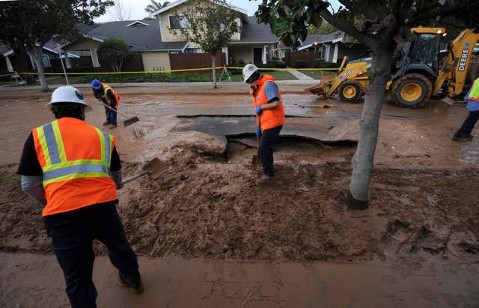Water Main Breaks Slow the 101 in Santa Barbara
Man Loses Car to Sinkhole on Castillo Street

A man living on Castillo Street was abruptly wakened at five o’clock this morning by police knocking on his door to tell him his car had fallen into a sinkhole. A cascading series of events led from that alarm to the current closure of a short stretch of the northbound Highway 101 slow lane and the Carrillo Street on ramp.
A break in a 12-inch water main, vintage 1924, under the 1200 block of Castillo broke through the asphalt at around 3 a.m., and numerous cars along the block have been towed in order to make room to fix it. City workers shut the water valves to stop the leak, explained water system manager Cathy Taylor, and the resulting pressure wave caused the break in a 10-inch steel water main running under the freeway near Victoria Street. Water flooded the freeway until valves to either side were shut down. Once Caltrans is done making temporary repairs to the number three (slow) lane, the Carrillo on ramp will reopen. Permanent repairs will be made after the agency has completed its analysis.
Nine properties lost water, two of them apartment buildings, and Taylor stated it was back on by 9:45 a.m. The shut-down under-freeway water pipe is part of the redundant water system — which keeps water circulating and prevents it from getting stale — and no service disruptions are expected across town. Repairs are planned for this section of water main, which has sections of pipe that are all 60 years old or older.
The man who lost his car, who asked not to be identified, had just gotten it back from an overhaul at the shop, and now it’ll have to go back if it’s not a total loss. “It was a big surprise for me,” he said. City workers told him the water would be fixed in a day and the street in a couple of days. “The city’s been helpful,” he added. “They said everything would be taken care of.”
Taylor explained that the city’s program to fix one percent of its 300 miles of pipe — or three miles — each year had been deferred because the drought. It takes a significant amount of water to replace mains, she said, and it sent the wrong message for the city to be seen running water down the streets to purge the lines. Instead, City Water spent the money saved on drilling new wells and buying water supplies. The breaks in the old pipes could be attributed to the drought, she suspected, as the soil contraction and expansion from the drought and now the rain could be taking its toll.
The pipeline that broke was on the list for replacement, she said. “It’s been raised to the top of the list.”


